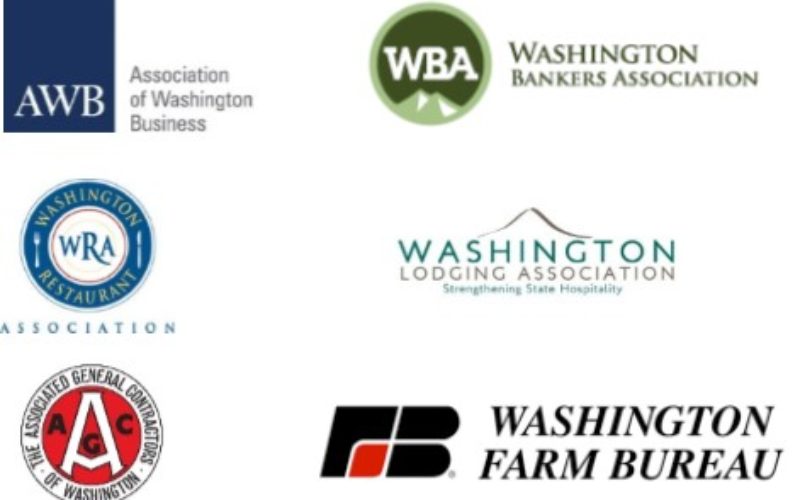I-1433 will increase the minimum wage, but job seekers deserve a better law.
(July 6, 2016) Washington employers of all sizes and from a cross-section of industries voiced concern today that although raising the minimum wage through Initiative 1433 sounds good, the unintended consequences could be harmful, particularly for first-time job seekers.
Business groups, including the Association of Washington Business (AWB), Washington Restaurant Association, Washington Lodging Association, Washington Farm Bureau, Association of General Contractors (AGC), Washington Bankers Association, and the Washington Affordable Housing Council oppose the initiative, but also believe that a thoughtful middle ground to increase the minimum wage could have been found in the Legislature.
If passed, Initiative 1433 (I-1433) would begin raising the statewide minimum wage to $13.50 per hour by 2020. The first jump from the current $9.47 to $11 an hour would go into effect on January 1, 2017, less than two months after the November election.
The organizations met with lawmakers, business associations and union representatives to find a legislative solution this year, calling for a compromise during the legislative session. But, opposition within the Legislature created the vacuum that has led to the blunt instrument that is I-1433.
“We want to create opportunities for everyone to succeed without jeopardizing job retention and growth, particularly in rural communities,” said AWB President Kris Johnson. “For us, that means support for entry-level jobs and recognition of other compensation that employers already provide like healthcare, retirement and scholarships. Business owners want to see their employees succeed and care about giving people the opportunities that were once given them.”
The Washington Restaurant Association and the Washington Lodging Association, an advocate for raising the minimum wage in a responsible way, also oppose I-1433.
“We went to the Legislature and also submitted our own initiative because we believe the voters deserve more than one option on the ballot. However, in this polarizing election year, there wasn’t support for a moderate voice in either of those venues,” said Anthony Anton, president and CEO of the Washington Restaurant Association and Washington Lodging Association. “I-1433 could have been more drastic and proposed $15 overnight, and many hospitality businesses wouldn’t have made it in that case. But, we still believe our state can do better.”
Anton added that Washington hospitality based businesses report that reducing staff, or cutting staff hours, will likely be an unintended consequence of higher labor costs, followed closely by an increase in menu prices, which could price restaurants and hotels out of businesses and the jobs that they support.
“A law to increase the minimum wage without providing support for starting jobs, or those that get young adults their first work experience will hit farming operations, particularly smaller ones, and their employees hard,” said John Stuhlmiller, chief executive officer for the Washington Farm Bureau. “Agriculture is one of the largest economic drivers in the state and the top job-creation engine in rural parts that need the employment opportunities the most. This initiative puts those job opportunities at risk.”
I-1433 would raise the minimum wage from $9.47 to $11 beginning Jan. 1, and require employers to provide up to 12 days of paid sick-leave. The combined impact of those requirements — instituted at once — would be a costly shock wave to small employers.
“For its part, the employer community has been a reasonable voice in the debate and has tempered union proposals with business solutions with the hope that any minimum wage measure was responsive to both the needs of employers and employees,” said Jerry VanderWood, chief lobbyist for the AGC. “This initiative doesn’t factor in what construction employees ask for, nor does it allow for thoughtful exemptions of parts of the initiative, such as the sick-leave component. A one-size-fits-all approach in the state and across all industries is the wrong approach.”
Service-sector jobs, which will be impacted the most if the initiative passes, are the gateway to employment opportunities, particularly for younger, unskilled workers.



